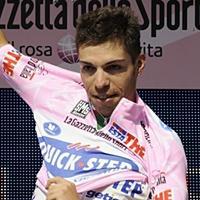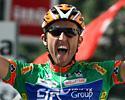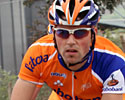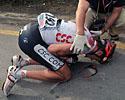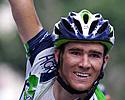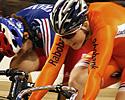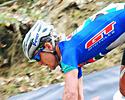First Edition Cycling News, May 16, 2008Edited by Laura Weislo Two-man battle for pink goes to Italy
For the second stage in a row, a breakaway stayed clear until the end in the Giro d'Italia, and this time CSF Group Navigare's Matteo Priamo won stage six from a group which gained 11'34" on the peloton. With race after race this season being decided from escapes, it begs the question, are bunch sprints going out of style? Sprinter extraordinare and maglia ciclamino Daniele Bennati led the group home, but his Liquigas squad, not wanting to defend Franco Pellizotti's leader's pink jersey at any cost, passed the responsibility on to Giovanni Visconti and his Quick Step team. Even with the shortening of the marathon sixth stage, high temperatures and long transfers made for a weary peloton which didn't seem motivated to bring back the dozen men in front, allowing them a maximum of sixteen minutes lead. When it became clear the peloton would not close down even half that advantage by the end, the pressure to gain the maglia rosa fell on the two best placed riders in the breakaway: Gerolsteiner's 24-year-old Matthias Russ and the 25-year-old Italian champion Visconti, who began the day at 1'39" and 1'52" behind Pellizotti, respectively. The cagey Italian took a six second bonus at the intermediate sprint in Manfredonia, closing the distance to pink down to seven seconds – a margin which Visconti would take back in the final 350 metres to tie with Russ on time. Visconti was awarded the leader's jersey, and was thrilled with the achievement, but said that it took a lot of hard work. "This morning on the team bus all my team-mates were urging me to go for the pink jersey. The first two hours we kept up an intense rhythm as we tried to gain as much ground as possible on the group," Visconti explained. Averaging close to 50 kilometres per hour, the high speed of the leaders created a choice for the Liquigas team – and after about an hour, the decision was made to call off the chase, allowing the breakaway's advantage to balloon.
Cyclingnews will cover the 60th edition of
the Dauphiné Libéré live
as of stage 4 on Wednesday, June 10, at approximately 15:00 local Europe
time (CEST)/ 23:00 Australian time (CDT)/ 9:00 (USA East). Once the gap was established, the fight for the pink jersey overtook the desire for stage glory. "There were two of us jockeying for first place in the standings," said Visconti, "me and the German rider Russ from team Gerolsteiner. He was glued to my back tire and at that point I was only trying to gain the margin necessary to wear the pink jersey. In the last 350 metres I gave it everything I had, trying to gain as many seconds as possible. Those were the fastest 350 metres I've ever ridden in my life." Of course, Russ was as disappointed as Visconti was elated. "It is a shame, it was so close. I was fully focused on Visconti, because I knew that he was the most dangerous competitor for me. It is bitter, it would have been my greatest success so far to ride in the pink jersey. But I will try again tomorrow, " said Russ. Gerolsteiner's director Christian Henn shared the rider's disappointment, saying that Russ rode an "almost perfect race". The race jury awarded Visconti the jersey using the fractions of a second from the team time trial – a margin which came down to the hundredths of a second, according to Henn. (See Classifications demystified for an explanation of tie-breaking rules.) With such a small gap, the maglia rosa is still within reach of the German. "I will try everything on Friday and attack," said Russ. Stage six reactions
At 231.6 kilometres, Thursday's marathon stage was still the longest course in the Giro even after being shortened. For the men in the breakaway, this meant about 185 kilometres off the front – almost four and a half hours of hard riding. Understandably, each man hoped to cash in those calories burned for some podium time, but there is only room for one man on the top step. Matteo Priamo (CSF Group Navigare) emerged victorious, besting Alan Pérez (Euskaltel-Euskadi), with Nikolai Trusov (Tinkoff) in third and Paul Martens (Rabobank) in fourth. While Giovanni Visconti and Matthias Russ focused on the overall classification, Jason McCartney (Team CSC), Magnus Backstedt (Slipstream Chipotle - H30), Daniele Nardello (Serramenti PVC Diquigiovanni), Francesco Gavazzi (Lampre) and Maxim Iglinsky (Astana) were left empty-handed at the day's end. Francesco Gavazzi (Lampre):"I'm happy because I was in the right breakaway, but I hoped to get something more important," said Gavazzi. "Over the past few days I suffered from pain in my ankle, and today the pain decreased so I was able to pedal in a good way. When Priamo and Pérez attacked in the final kilometres, I tried to follow them and I almost succeeded in doing it, but then I was not brilliant enough to chase them in the climb." Kim Andersen (CSC director):"They fought really hard to get away at the beginning of the stage. For the first two hours the average speed was about 50 kilometres per hour – and it wasn't because the route was flat that's for sure. As planned Jason made the break but unfortunately he wasn't quite strong enough when the whole thing was decided. "Today's stage shows that this year's Giro is very unpredictable and most definitely good entertainment. The tactical play for the lead means there are a lot of breaks and the fact that the final week is as tough as it is, means that the main favorites are nervous about exposing themselves too early in the game," said Kim Andersen following the stage. Paul Martens (Rabobank):
Rabobank's Paul Martens was one of the initiators of the breakaway, which went after the top the day's only classified climb. Making the decisive move was on the Dutch man's agenda, and he felt fortunate to make it. "It is difficult; on days like this, two-thirds of the pack wants to be on an escape. Yesterday, I focused on Jens Voigt; he always wants to jump away," Martens described on the team's website, rabobank.nl. But it is impossible to focus on just one person, though. It is matter of some gambling and having very good legs." After Priamo and Pérez escaped in the final ten kilometres, Martens bided his time and ultimately rode to fourth place. "I tried to keep up the pace so we would have a chance on the final climb, but everyone looked at everyone. At a certain moment there is no point in waiting anymore, and then I took off." "When such an escape succeeds you want to win, so in that sense I am a bit disappointed," said the rider. "But finishing with the first five in the first week of my first major tour is also obviously satisfying." A newcomer to the race, Martens is determined to show his talents again. "You end up in the history books when you win a stage. That is a major incentive to try again in the second or third week. I do not want to be just pack fill; that is just not my attitude." Maxim Iglinsky (Astana):"It was hard," Iglinsky described on the team's website astana-cyclingteam.com. "Maybe I let a chance go by to win a Giro stage. Priamo and Pérez were not better than the others but they played it very well tactically. We all made the mistake to look at Visconti. Visconti did not react and the two were gone! It is a pity, but the Giro is not over yet and I will try again. Now I cannot think about it, I am too tired. Anyway I am happy that my condition is better now. The last few days I suffered a bit with my health and I'm happy it's going better now." Frans Maassen (Rabobank manager):"We sensed that Liquigas was not going to defend the pink jersey at all costs. Danilo Di Luca's LPR [team] had also that figured out. They rode like crazy but could not close the gap. That is why [the break] got a lot of space very quickly. Too much space; that is why it became a poker game in our group." Leipheimer held up by policeAmerican Levi Leipheimer (Astana) lost 23 seconds on some of the race's top contenders in the final kilometre of stage six when a police motorcycle stalled out in a turn and held up several riders. Also affected was Colombian Mauricio Soler. The motorcycle stalled out at the exit of a hairpin bend, catching the riders who had taken the inside line by surprise. While no rider crashed, several were forced to unclip and stop. The Astana team has asked the race jury to review the incident and classify Leipheimer with the same time as the rest of the group. Unlucky 13 for MandriEstonian René Mandri may not have had triskaidekaphobia when he was given race number 13 at the start of the Giro d'Italia, but that may change after the AG2R La Mondiale rider helped to initiate the stage six winning breakaway only to crash out and abandon the race. The group of twelve riders were pushing to the limit to try to extend a two minute lead on the peloton when, 76 kilometres into the stage, Mandri crashed hard, suffering a broken vertebra and several fractured ribs and a perforated lung. The day also ended the race for Cofidis' Kevin De Weert and Milram's Enrico Poitschke, who had to cut short his Giro debut because of a cold. "I have been having breathing problems because of a cold for several days now," Poitschke said. "Today's stage started right off at a high speed. In my condition it was just not possible to keep up. Too bad that my Giro premiere was so short." Surgery for McGee
CSC's Bradley McGee has decided to undergo surgery to repair the collarbone which he broke during a fall in the Giro d'Italia's third stage. McGee, who faced a possible month-long absence from competition if he did not undergo surgery, consulted with doctors in Monaco and ultimately decided to have surgery to install a plate on the fractured clavicle. With his eye on racing the team pursuit in Beijing, McGee knows he must get back to training as soon as possible. "I've been to the hospital today to get the results of my x-rays and stuff and we've decided that I should have an operation done on Monday to have a plate inserted in my shoulder," McGee explained. "I'm happy about that because I've broken my collarbone before and if you just let it heal on its own you get problems with it later on so it's better to have the plate inserted. It prevents future problems and I'll be able to come back a lot quicker." The Australian already has a plate in his other clavicle. "I can't stand up too long at the moment because it's uncomfortable because of the pain, but after the operation I think I'll be back on the home trainer Wednesday next week. I've got this special apparatus, which takes the weight off my shoulders on the home trainer so I'm able to lean forward. I've used this machine before so I know the drill," McGee concluded. Feillu returns in Picardie
The Tour de Picardie is a sprinter's delight, and one of the fastest Frenchmen on two wheels, Agritubel's Romain Feillu will have his first taste of competition of the year starting on Friday. The second year professional took four wins in 2007 before being struck by a case of toxoplasmosis, a parasitic infection which can cause flu-like symptoms. While the mostly flat, four stage race totals just 543 km in length, Feillu is hoping just to finish the three-day event after putting only 2,500 kilometres of training in, but isn't discounting the possibility of a stage victory. "I'm already very fast in the sprint and a victory at this point in my recovery is possible in my opinion," he said on his personal website. What he needed me, is a race in the wheels and without too many bumps." The sporting director of Agritubel Denis Leproux assured, however, that "will not ask anything special" Feillu: "If he follows the pack all day, this will be well. We do not ask him to win a stage or even to a sprint, it will serve its sensations." Agritubel will also have 2006 Tour de Picardie champion Jimmy Casper among its ranks. Casper took the win that year on an intermediate time bonus on the final stage – a typical outcome in this race which is usually decided by seconds. Barloworld's speedy South African Robert Hunter will return to try and defend his title, but will face competition from Belgians Leif Hoste and Greg Van Avermaet (Silence Lotto) and Frenchman Sébastien Chavanel (Française des Jeux) and Slipstream's Tyler Farrar. Dutch coach picks Beijing trackies
The national track coach of the Netherlands, Peter Pieters, announced the preliminary selection for the Beijing Olympic Games on Thursday. The final selection will be announced mid-July. Theo Bos, Teun Mulder and Tim Veldt will make up the Dutch Team Sprint squad, while Bos and Mulder will contest the sprint and keirin with Veldt as a reserve. In the endurance events, the individual and team pursuits, points race and Madison, Levi Heimans, Jennings Huizinga, Pim Ligthart, Jens Mouris, Peter Schep, Robert Slippens, Wim Stroetinga and Niki Terpstra were named, with Geert Jan Jonkman and Danny Stam reserve. For the women's sprint, Yvonne Hijgenaar and Willy Kanis will head to China while world champion Marianne Vos will contest the points race. The Dutch team earned a total of 20 places in the Beijing Games through its performances in the 2007-2008 season, leaving six more names to be filled in. High Road hoping for more in FranceHigh Road heads to this year's Tour de L'Aude hoping to improve on last year's third place by Judith Arndt. The team has had a successful spring campaign, with Arndt seizing the World Cup leader's jersey by taking the win in the Ronde van Vlaanderen and a third in La Flèche Wallonne. The riders will have to change focus now after concentrating on the one-day events, but team director Ronny Lauke is confident. "We're coming into L'Aude after a bit of a break in racing, and it's never easy in any case to change your strategy from one type of event to another. But we're sure we've got it right. Everybody's very motivated." After a short 3.9 kilometre prologue on Friday, the team is expecting to see its plan of action solidify on the 8.5 kilometre climb mid way through Saturday's stage. "There is nowhere to hide on that climb, it'll be hard enough to tell you a lot about our riders and our rivals and how they'll perform later on in the Pyrenees," said Lauke. "Once we've come through that stage and got a better idea of everybody's exact condition, we'll work out a long-term strategy for the rest of the race." "The team time trial on Sunday is another big goal for High Road, too, it's a stage which always pulls the squad together as a unit." Last year the squad snapped up four stage wins as well as a third place overall for Judith Arndt. "That was very good, but this time round, we're convinced we can push it up another level." High Road for Tour de L'Aude: Judith Arndt, Luise Keller, Alex Rhodes, Ina-Yoko Teutenberg, Linda Villumsen, Anke Wichmann. Stander back racing in South Africa
Recently returned from several European World Cup races, Burry Stander (Mr Price / GT Bicycles) will be the favorite in the elite men's race at the final round of the Mazda MTN National Mountain Bike Series cross country race in Mpumalanga, South Africa, on Saturday, May 17. Stander, who finished seventh and 13th at two of the spring UCI World Cups, will be looking for a race win, but he's not part of the battle for the series title as he has competed in just two of the four events thus far. Stander has his sights firmly set on the Olympics in Beijing in August. He will be the only man from South Africa racing the cross country. Looking toward this weekend, Stander said, "I'll be starting with a pair of legs that aren't too fresh because I've been training and racing a lot, but I'm lining up to try and win as always and I'll be going flat out. "The course at Mankele is new and it looks like fun. I'm quite excited to be racing at a new mountain bike park in South Africa." The series title contest, featuring six laps on a 7km loop, will be between Namibians Mannie Heymans (MTN Energade) and Marc Bassingthwaighte (Garmin DCM), Andrew Warr, Justice Makhale (USN) and Johan van Zyl (Mr Price GT), all of whom are separated by small points margins. Warr and Makhale have built up their points collection at provincial and national series races, while Van Zyl, Heymans and Bassingthwaighte have been consistently dominant at the national series events. The presence of South African champion Brandon Stewart (USN) and African champion Melt Swanepoel (MTN Energade) will only make the race a tougher battle. Balco head reveals methods, offers anti-doping adviceAfter masterminding a designer steroids ring which allowed athletes to cheat without detection, former BALCO head Victor Conte is now offering up detailed accounts of the doping regime used by top track and field athletes and giving anti-doping advice to the US Anti-doping Agency (USADA), the World Anti-doping Agency (WADA) as well as the authorities in the Great Britain (UK Sport). Conte served a four-month prison sentence for conspiracy to distribute steroids and money laundering, while the scandal also put former Olympic gold medallist Marion Jones in prison for perjury. Track cyclist Tammy Thomas was convicted of perjury in April in relation to the case. At the request of British sprinter Dwain Chambers, Conte spelled out the entire doping regime to UK Sport in order "to improve the effectiveness of their anti-doping programs." Published by the BBC News, the letter outlines a performance enhancing regime that included seven banned drugs including the designer steroid known as "the clear", THG, as well as testosterone/epitestosterone cream, EPO, HGH, insulin (Humalog), modafinil and liothryonine (a synthetic form of the T3 thyroid hormone). Most of the doping occurred during the off-season, where Conte advised the anti-doping authorities to focus their testing. "Many drug-tested athletes use what I call the "duck and dodge" technique," Conte wrote. "This is basically how it works: First, the athlete repeatedly calls their own cell phone until the message capacity is full. This way the athlete can claim to the testers that they didn't get a message when they finally decide to make themselves available. "Secondly, they provide incorrect information on their whereabouts form. They say they are going to one place and then go to another. Thereafter, they start using testosterone, growth hormone and other drugs for a short cycle of two to three weeks. "After the athlete discontinues using the drugs for a few days and they know that they will test clean, they become available and resume training at their regular facility." Conte criticized USADA for focusing the bulk of its testing in-season. "It's my opinion that more than fifty percent of the drug tests performed each year should be during the off season or the fourth quarter. This is when the track athletes are duckin' and divin' and using anabolic steroids and other drugs." USADA CEO Travis Tygart responded, "Since our creation in late 2000 and before we disciplined 16 people associated with the BALCO doping conspiracy, USADA had incorporated and continues to incorporate all appropriate intelligence into our testing program. Our efforts to protect the rights of clean athletes has always has been focused on intelligent target testing and not simply on the number of tests." In a statement, WADA acknowledged that Conte has met with USADA and said, "We would expect that he would have shared any current and credible evidence of doping that he might have with them. The agency supported USADA, saying it has "full confidence in USADA, one of the foremost anti-doping agencies in the world which, interestingly, assisted U.S. law enforcement authorities in uncovering illegal activities of Mr. Conte and a number of his athletes." "WADA has also heard from Mr. Conte and will continue to give his comments, along with other intelligence received, balanced consideration and to pass it on, as and if appropriate, to the relevant testing authorities. (All rights reserved/Copyright Future Publishing Limited 2008) |

|
January 2009 |
Recently on Cyclingnews.com |

